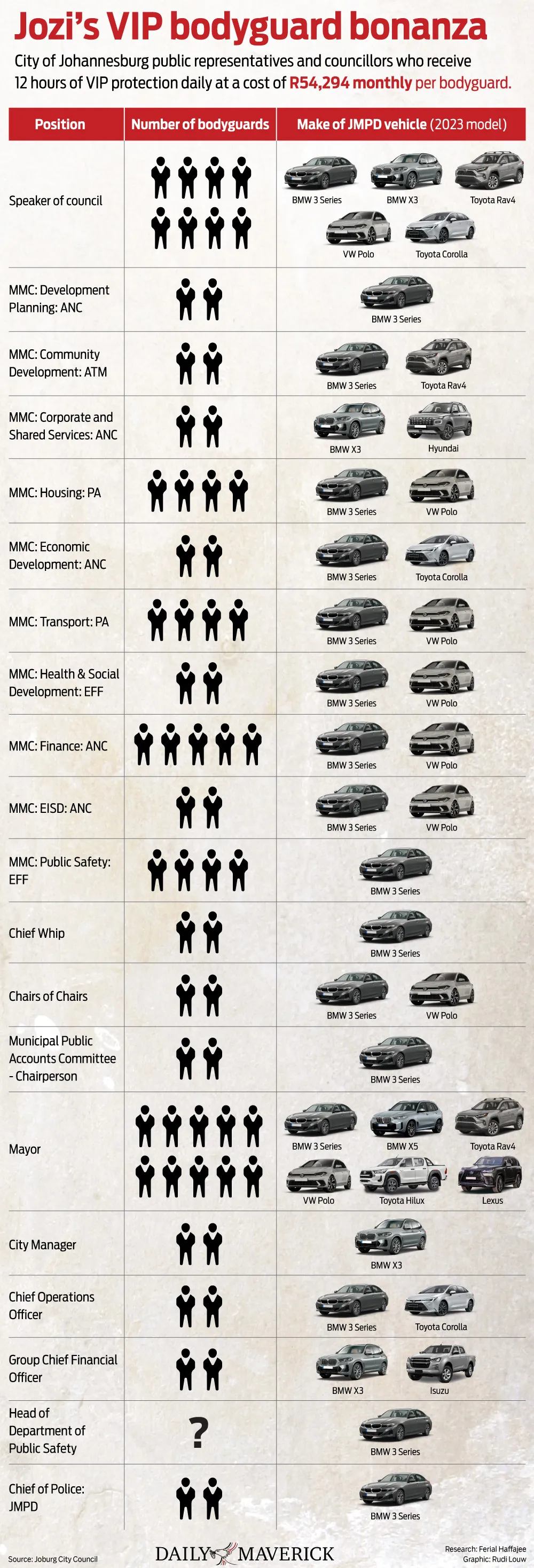The ANC-EFF coalition with minor parties in the City of Johannesburg is spending more on VIP bodyguards than any other city in South Africa, even as its finances are in trouble.
The coalition government has adjusted its budget from R83-billion to R76-billion as declining revenue harms services — but the council’s last meeting approved a spending splurge for city bigwigs.
Executive Mayor Kabelo Gwamanda of the three-seat Al Jama-ah party will have 10 bodyguards, with five per shift, from the Johannesburg Metropolitan Police Department (JMPD) and three cars in his convoy. Daily Maverick understands a total of eight cars from the JMPD fleet are allocated to him.
The speaker, Margaret Arnolds, from the two-seat African Independent Congress party, will have eight bodyguards, four per shift.
By comparison, Joburg’s former mayor Mpho Phalatse had eight bodyguards, four per shift, while Cape Town’s mayor, Geordin Hill-Lewis, has four per shift.
However, the city says that it must protect its office bearers and that allocating VIP guards will not harm its plans to improve services. (See its complete response below.)
The ANC caucus leader and power behind the throne, Dada Morero, gets five bodyguards and a convoy of two cars as the MMC for finance. He has overseen the rapid decline of the city’s finances as the inefficient centralised billing system sees the city rack up billions in debt.
City Power’s electricity cuts are often worse than Eskom’s. Customers who can are leaving the city grid in droves, cauterising its primary source of revenue. Johannesburg runs off its profits from service tariffs and network charges from supplying electricity.
Read more in Daily Maverick: Joburg mayor says there is no water crisis as Eikenhof pump station goes down again
The city has borrowed R2-billion from the Development Bank of Southern Africa (DBSA) to fund operating costs and has tapped a $100-million facility from the World Bank’s lending arm, the International Finance Corporation (IFC), payable over the long term.
The party bosses and certain heads of administration, like the city manager, Floyd Brink, will be chauffeured in BMWs, while their support staff and protectors will use smaller sedans or SUVs.
The politicians will remove 40 cars from the fleet of the JMPD, which is meant to control traffic, enforce by-laws, and assist in crime prevention.

Local State Capture
The DA and ActionSA opposed the splurge, but the governing coalition passed it, with a slim majority. The EFF and Patriotic Alliance MMCs get four bodyguards each because they occupy the big-spending portfolios where risks are assessed to be higher as more tenders are given out.
Local State Capture is rampant in Johannesburg because of the big budgets and high contract values of outsourced services. The same patterns set out in the Commission of Inquiry into State Capture are evident in the city.
According to sources, the city’s companies, where spending is highest, are run by increasingly politicised boards which can direct contracts to companies aligned with, or with influence over, the parties in the ANC-EFF-led coalition. The competition for contracts is intensifying.
The immediate reason for the new VIP allocations was the shooting of council Chief Whip Sithembiso Zungu in January at a Rand Water function at a school in Zakariyya Park, Lenasia.
Rand Water executive Tebogo Joala was killed in the shooting, which was a targeted assassination, his family said. Joala’s bodyguard was also killed, while Zungu was shot when he confronted the gunman. Rand Water has not released the details of an investigation into Joala’s killing, which Water Affairs Minister Senzo Mchunu has asked for.
The City of Johannesburg has always provided bodyguards to its top officials. But now it has expanded the numbers of those getting VIP protection, even providing bodyguards to committee chairpersons, who are councillors from the EFF and PA.
Belinda Echeozonjoku, the Johannesburg DA caucus leader, said her caucus opposed the spending and expanded protection services beyond justifiable precedents.
The Johannesburg Crisis Alliance (JCA) said the money should rather be spent on services.
“The JCA is shocked that the Johannesburg Council approved the proposal to spend over R3-million a month on VIP protection for the executive of the council and other office bearers of the council such as the Speaker, chief whip, chair of chairs and chair of the municipal public accounts committee.
“The costs do not include the vehicle costs for the almost 40 cars that will be bought to provide VIP protection services. This expenditure is unwarranted and is nothing more than an attempt to emulate the blue-light culture that exists at national and provincial level,” said Ishmael Mkhabela and Shan Bolton of the JCA.
“For a city in deep financial trouble, this extravagance is another slap in the face and we are sure it will not go down well with the many who have to endure the daily deterioration of services across the city.”
The JCA is a civil society alliance of residents and organisations who want the national government to intervene in the city’s rapid decline.
Crime out of control
According to the SAPS’s latest crime stats release for October to December 2023, crimes in all categories increased significantly in Johannesburg. While wealthier areas are zones of relative safety with sophisticated private security, the inner-city and working-class outer regions are under the cosh of crime.
The policing districts of the inner city — Jeppe, Hillbrow, Moroka, Eldorado Park, Diepsloot, Alexandra, Roodepoort, Lenasia, Jabulani and Protea — are areas where crime has spiralled to levels that make life hazardous.
Murder, assault, robbery and kidnappings remain distressingly high. Carjacking is up again after trending down. More people are murdered in open or public spaces in Johannesburg with a firearm than anywhere else in the country, showing that visible policing, which a metro police service can provide, is an obvious need.
City’s response
“The resolution aligns with the Remuneration of Public Office Bearers Act and determining upper limits of salaries, allowances and benefits for municipal council members as gazetted,” the city’s communications team said.
“The regulations stipulate that in cases of threats against councillors, the South African Police Service must conduct an assessment, and the municipality must provide security for the concerned councillor(s). There is no diversion of service delivery resources involved.
“The approved report on the safety of councillors is in line with the city’s obligations with the gazetted regulations. We remain committed to ensuring the safety and wellbeing of all public office bearers.”
In response to this article, the city issued a statement on what it claimed was “misinformation circulating” regarding its protection and security system for VIPs.
“The policy recently approved by Council seeks to regularize and standardize the provision of protection services in compliance with relevant legislation and regulations,” it said on Tuesday.
“The policy stipulates that protection services are offered on an ad-hoc basis, based on a threat risk assessment conducted by either the State Security Agency or the South African Police Services.
“Furthermore, there has been no additional budget allocation for this purpose, and there is no diversion of resources from essential service delivery to fund protection services.
“The recent reallocation of adjustment budgets focuses on key service entities such as City Power, Joburg Water, and Pikitup to ensure the continuity of essential services without disruption.
“The approved policy is aimed at ensuring the City has the means and basis to provide protection to Councillors as and when a risk assessment determines such is required.
“The City of Johannesburg remains steadfast in its dedication to creating a secure environment for all residents and stakeholders. The protection of the City’s elected representatives is an integral component of our efforts to maintain a safe and functional city for everyone. “
The city said it was “concerned about the exaggerated numbers currently circulating”, an apparent reference to the number of bodyguards and cars allocated to city leaders. The city, however, did not respond to a request for comment on the specific numbers at the time of writing and the article has been updated for clarity. DM
This article has been corrected to reflect that Mayor Gwamanda has been allocated 10 bodyguards who work in shifts of five.
It has also been corrected to reflect that former mayor Phalatse had eight bodyguards working in shifts of four.





